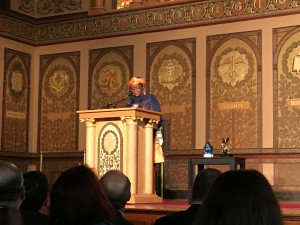Sexual Violence Under War and Peace
On March 11, the United Nations Security Council adopted special measures to prevent and combat sexual exploitation and abuse by UN peacekeepers. The measures address an internal report stating that 69 allegations of sexual exploitation and abuse were made last year. The Democratic Republic of Congo, Liberia, Haiti, and South Sudan accounted for the largest accusation numbers. While sexual violence has long been an abhorrent feature of war, the allegations against UN peacekeepers tasked with maintaining the peace and preventing atrocities are particularly disturbing. In recent years the UN has taken more initiative to combat conflict-related sexual violence. In 2009, it established the Office of the Special Representative of the Secretary-General on Sexual Violence in Conflict, which emphasizes how sexual violence undermines post-conflict peacebuilding efforts. It counters the narrative that the crime is an inevitable byproduct of war; rather, it is a preventable and punishable crime under international law.

On February 23, the UN Special Representative of the Secretary-General on Sexual Violence in Conflict, Zainab Bangura, delivered her address on “Human Security in the Face of Violent Extremism” to the Georgetown community. She explained that, “In the contemporary theater of conflict, women and girls find themselves under assault every day…whether at border crossing, checkpoints, during house searches, in detention centers, and in the very camps or settlements where they seek refuge.” She called for accountability and reparations for the victims; the United Nations is taking steps to live up to her call in response to their internal problem with peacekeepers.
The resolution itself is a critical step because it is the first passed by the Security Council to address sexual abuse allegations against peacekeepers. In addition, UN Secretary-General Ban Ki-moon reiterated the UN’s zero-tolerance policy of such behavior. The next steps will be assistance for survivors and accountability from the level of perpetrators to each Member State.
However, the UN’s commitment to provide assistance for survivors faces roadblocks. In 2007, the UN adopted a strategy on assistance and support to victims of sexual exploitation and abuse perpetrated by UN staff that called for mechanisms to provide support in each country in which it operates. According to the UN, assistance includes medical, legal, psychological, and social services. Unfortunately, the reality on the ground makes it difficult for the UN and NGOs to come together to implement these measures to a sufficient degree.
Additionally, it is unlikely that true accountability will materialize given the nature of the system. During the Security Council meeting on March 12, Ban Ki-Moon noted that accountability is a shared responsibility requiring action by Member States, especially troop-contributing countries. Under UN rules, it is ultimately up to the country that contributed the accused peacekeepers to investigate and prosecute the cases. However, the strength of the judicial system that assesses sexual abuse allegations varies by country. In her address, Bangura stated, “…we think that in every country, rape is a crime. But it’s not. As I said, in a place like Cote d’Ivoire, it’s a crime against the moral, not a crime against the person.” According to Bangura, the first step to national reform is to push countries to acknowledge that there is a problem. Acknowledgement breaks cultures of denial and provides a foundation for change. Bangura has signed agreements of acknowledgement with countries including Somalia, South Sudan, and the Democratic Republic of the Congo; however, the road to reform is a slow one.
If the United Nations aims to bring peace, it cannot allow sexual violence by its peacekeepers to go unchecked. A firm response to its internal issue sets an example for Member States. However, justice for survivors of sexual violence and abuse is a long term, global challenge. In the short term, the UN should do everything in its power to reform itself because it cannot provide peace if women and girls are under attack.
 Nicole is a junior in the School of Foreign Service majoring in International Politics with a Concentration in International Security. Raised Swiss-American, she is constantly on the search for the perfect chocolate.
Nicole is a junior in the School of Foreign Service majoring in International Politics with a Concentration in International Security. Raised Swiss-American, she is constantly on the search for the perfect chocolate.
